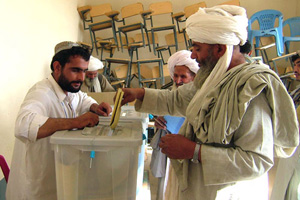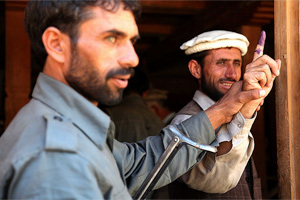The other day, on the front page of my hometown newspaper was a shocking tale of Iranian perfidy in Afghanistan headlined “Iran Is Said to Give Top Karzai Aide Cash by the Bagful.” The mounds of euros reportedly being passed to Afghan President Hamid Karzai’s chief of staff Umar Daudzai were a familiar form of influence peddling—intended, as the New York Times piece put it, “to buy the loyalty of Mr. Daudzai and promote Iran’s interests in the presidential palace, according to Afghan and Western officials here. Iran uses its influence to help drive a wedge between the Afghans and their American and NATO benefactors, they say.”
The Times even had a vivid account of a “large plastic bag bulging with packets of euro bills” being passed to Daudzai on a plane departing Iran. Strange, though, how few seem to remember the way American “benefactors” launched this latest disatrous chapter in Afghanistan’s three-decade-old catastrophe by proudly delivering their own bag-equivalents stuffed with cash. Back in 2001, with planning for a US invasion ramping up, CIA agents reportedly appeared in Taliban-free northern Afghanistan with devastatingly convincing arguments for supporting Washington: metal “suitcases”—okay, when it comes to bribery, call us a little classier than our rivals—stuffed with millions of dollars in non-sequentially numbered hundred-dollar bills. Back then, it was called “preparing the ground” for invasion and, at the time, was considered not perfidious corruption but brilliant spycraft. Of course, in one form or another, as Karzai—who, as Juan Cole recently commented, “appears not to understand the word ‘corruption'”—noted in a news conference this week, American money has never stopped flowing in staggering amounts.
Or what about this for bribery, even if here it’s called “a classic carrot-and-stick approach”? The Obama administration recently offered the Pakistani military another $2 billion in weaponry, equipment, and training. However, the size, scope, and perhaps even existence of the aid package will reportedly be dependent on that military’s launching an operation Washington desperately wants against Taliban-allied forces in North Waziristan. In a less-noted story, the Wall Street Journal reports that the administration has been pushing Pakistan’s government hard to let many more CIA agents into the country. If that request is finally granted, who knows what they might be bringing in their suitcases. After all, the CIA has quite an Iranian-style history of successfully bribing politicians, including in Italy and Japan after World War II. Of course, there the suitcases of cash went to “our” politicians and for perfectly righteous reasons.
Meanwhile at home, in a midterm election season not exactly lighting up the skies with democratic possibilities, cash is raining down, and unnamed corporate entities are seizing the democratic day. What in our media is called “fundraising”—if the Iranians were doing it, we’d have another name for it—is heading for the $2 billion mark for House and Senate races (or, on average, about $4 million for every congressional seat up for grabs in 2010), and that doesn’t even include the approximately $400 million being raised by what our media usually politely term “outside interest groups.”
As Ann Jones, TomDispatch regular and author of a remarkable new book, War Is Not Over When It’s Over: Women Speak Out from the Ruins of War (on which more in a future post) suggests, perhaps it’s time to be a little less surprised when the “democracy” we installed in Afghanistan turns out to be a democracy of cash-filled bags and suitcases.








